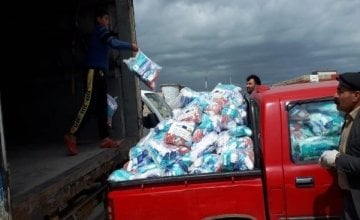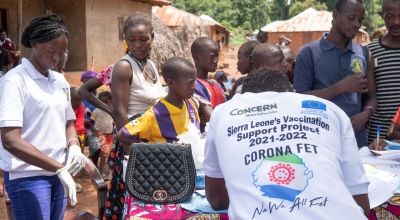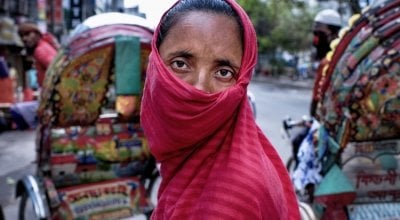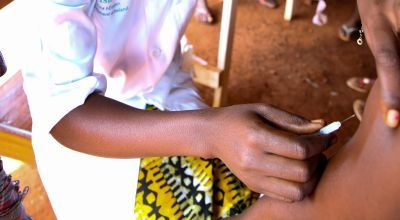
Read our 2024 annual report

Knowledge Hub
COVID-19 has brought all the world to a standstill but it’s not ‘the great leveller’ that we have heard about, explains Concern's Chief Executive Dominic MacSorley.
A virus that is indiscriminate increases the risks for those who are already vulnerable -- individuals, groups and societies. Right now, as the coronavirus spreads in Africa, some of the world’s poorest countries are facing catastrophe.
In Ireland, we have responded to the virus by assuming that everyone is at risk, and everyone is also a risk to others, especially older people and those with underlying conditions.
The scale of that challenge in Africa, particularly in countries where Malaria, malnutrition, Tuberculosis and HIV/AIDS are widespread, is even more immense.
Although Africa’s population is younger than that of Europe, health systems in almost all African countries are vastly under-equipped in comparison.
An imminent crisis
Last month, the HSE ordered a further 900 ventilators, in addition to the 1,229 machines already in use in Irish hospitals. In contrast, Central African Republic, which has a similar population to Ireland with 4.5m people, has just three. Sierra Leone, with a population of almost eight million people, has a single functioning ventilator.
In the face of these restrictions, many African countries have acted quickly in implementing preventative lockdowns. However, the suspensions of movement and business bring an almost immediate economic and food security crisis.
After a month of lockdown, we are now seeing many families in Italy struggling to afford food. In Sub-Saharan Africa, 500 million people live on less than $1.90 a day and are mainly dependent on the informal sector for income. If they don’t earn, they don’t eat.
Right now, the window for action is the most important thing. Africa is estimated to be roughly a month behind Europe. While there were 10,000 recorded cases across the continent as of last week, the London School of Hygiene and Tropical Medicine predicts that most African countries will have each reached 10,000 cases by mid-May. Models vary and they are inherently speculative but they should not be ignored because the consequences of doing so could be devastating.
If there is one strategy that has is increasingly discredited, it is that of ‘herd immunity’. We now know that this virus spreads with incredible ferocity, with the UK now suffering the devastating consequences of just considering the option for a short period.
Supporting the community
We know that this virus is most devastating in centres of dense population. London, Madrid, New York, and Dublin are the centre of their nation’s outbreaks. While Africa has a far higher of proportion of its population living in rural areas, vastly overcrowded settlements with no public services in cities such as Nairobi and Kinshasa leave little opportunity for social distancing.
Even more compromised are those forced to flee their homes because of war or natural disaster, such as South Sudan where more than six million people are already experiencing severe food insecurity - many of them still crammed into vast displacement camps, living in tents or under plastic sheeting.
Responding in contexts like these is daunting and complex but it is possible, and it can be life-saving.

In countries such as Sierra Leone and the Democratic Republic of Congo, the same channels of community mobilisation and hygiene sensitisation that were used to fight the Ebola virus are now being used to channel messaging on COVID-19.
This week, our Concern teams distributed soap, detergent, and hygiene kits to 84,000 displaced people in camps in northern Iraq; improved basic water systems and distributed safety masks in the prisons of Afghanistan; drilled wells in the Central African Republic, and intensified public information ‘wash your hands’ campaigns of COVID-19 in Bangladesh, Pakistan, and Malawi.
In Niger, we are converting Concern vehicles into temporary ambulances. In the refugee camps of Cox’s Bazar, we have initiated social distancing and hand sanitation at nutrition treatment centres and accelerated our therapeutic food rations to ensure that malnourished children experience no breaks in their treatment.
In the fragile and conflict-affected countries where we work, there are no government-led systems of social welfare that cover all citizens. However, ambitious humanitarian response infrastructure does exist and is designed to be scaled up quickly in times of emergency.
Using mobile money technology, these systems are critical in providing basic social protection, allowing families to access vital supplies while sustaining local markets and small businesses.
Time for action
Two years ago, when ferocious drought hit, it was these timely cash injections that prevented millions of people from slipping into famine across the Horn of Africa. Today, these are some of the practical strategies that we will need to scale up immediately.
Concern’s efforts are part of what is now a global humanitarian response to minimise the overwhelming impact of this virus, but timing is critical. Scaling up our operations is essential now and for that, resources will be urgently needed.
We cannot afford to delay or to be defeatist. To surrender the vulnerable to this virus in Africa would not only be a moral catastrophe, it would also mean the pandemic is never brought under control.
Support our COVID-19 response
Our impact in 2024
people reached through our emergency response
people reached through our health interventions
people reached through our livelihoods programmes





